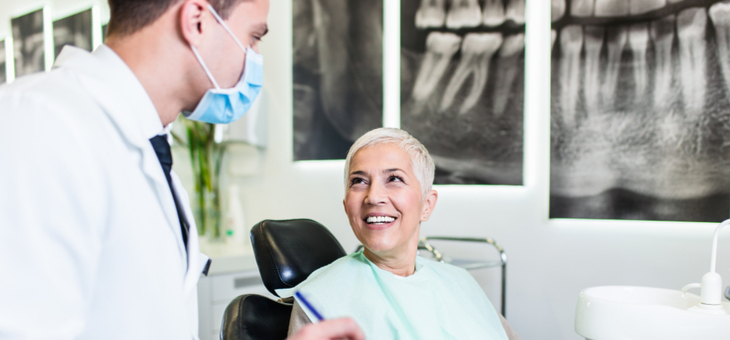It’s Dental Health Week and the Australian Dental Association is reminding older Australians of the four regular habits we all need to observe to ensure optimum oral health.
“The ADA is promoting four key oral health messages for Dental Health Week,” said dental association spokesperson Dr Mikaela Chinotti.
“These include regular visits to the dentist, twice-daily brushing with a toothpaste containing fluoride, flossing daily and eating a nutritious diet low in sugar.”
Here are some other top tips for the over 55s.
1. It might be personal hygiene 101, but only half of us brush our teeth twice a day. This, as well as using a toothpaste which contains fluoride, are key to maintaining good oral health, preventing tooth decay and gum disease, and maintaining fresh breath.
2. Don’t forget to floss daily – your dentist can show you the best technique. If you have trouble reaching into your mouth and if you find floss fiddly to use, there are flossing devices from the chemist which can help you to improve your reach. Ask your dentist for advice on the best products to use for your mouth, particularly for older Australians with stiff fingers.
3. Check inside your mouth after brushing your teeth. If you spot anything unusual, head to your dentist. Early detection of oral cancer is key as it can improve your prognosis.
4. Suffer from a dry mouth? This can be a side effect of several medications including ones for high blood pressure and cholesterol lowering. Make sure you drink plenty of water to stay hydrated; eat crunchy/chewy foods like celery, to help stimulate saliva flow; steer clear of mouthwashes containing alcohol; be mindful of the ‘hidden sugars’ in many foods and limit your alcohol and cigarettes. If you suffer from a dry mouth, you can be at increased risk of developing tooth decay.
5. If you’re wearing dentures, take them out at night to allow the soft tissues underneath to breathe – continual use can result in inflammation or thrush (a fungal infection) affecting the soft tissues the dentures sit on; leave them to soak in plain tap water overnight; clean your dentures daily using a toothbrush and soft hand soap – never toothpaste as it’s too abrasive – and soak them twice a week in a denture-cleansing solution recommended by your dentist, or in diluted vinegar (one part vinegar to 20 parts water).
6. If you have arthritic fingers or hands, there are a range of devices available which make tooth brushing easier, including brushes with wider handles which are easier to grip, and a toothpaste which glows in the dark, aided by a special blue torchlight that comes with it, so you can easily see the plaque you’ve missed. Your dentist or pharmacist may help you to source these items.
7. If you’re a snorer, consider talking to your dentist about the possibility that you may suffer from sleep apnoea. They will be able to check for intra-oral signs which can be related to sleep apnoea and refer you via your GP to a sleep physician for testing.
8. Oral health should be considered part of general health; medical conditions such as diabetes can impact your oral health. You’re at higher risk of developing gum disease if you have poorly controlled diabetes.
9. It can be hard to remember your medication names, especially if you take multiple tablets daily. Your dentist needs to know the names of your prescribed and over-the-counter medications; so keeping a list of medication names in your phone or wallet will ensure you never forget.
10. Last but not least, visit your dentist at least once a year to ensure your mouth is serving you well and your oral health is being looked after. Attending a dental clinic regularly increases the chance that diseases of the mouth are detected and treated in their earliest stages, therefore increasing a good prognosis. Prevention is much cheaper than treatment.
How often do you visit the dentist? Have you had any oral health issues?
If you enjoy our content, don’t keep it to yourself. Share our free eNews with your friends and encourage them to sign up.
Related articles:
Three major health funds slammed
Can moderate drinking prolong life?
Four new medicines added to PBS

